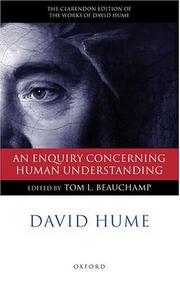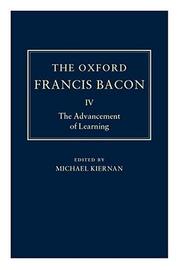| Listing 1 - 10 of 15 | << page >> |
Sort by
|
Book
ISBN: 0824056000 9780824056001 Year: 1984 Publisher: New York (N.Y.): Garland,
Abstract | Keywords | Export | Availability | Bookmark
 Loading...
Loading...Choose an application
- Reference Manager
- EndNote
- RefWorks (Direct export to RefWorks)

ISBN: 9780198250609 0198250606 9780199266340 0199266344 Year: 2006 Volume: 3 Publisher: Oxford Oxford university press
Abstract | Keywords | Export | Availability | Bookmark
 Loading...
Loading...Choose an application
- Reference Manager
- EndNote
- RefWorks (Direct export to RefWorks)
Knowledge, Theory of --- Hume, David, --- -Epistemology --- Theory of knowledge --- Philosophy --- Psychology --- Early works to 1800 --- -Early works to 1800 --- Knowledge [Theory of ] --- Knowledge, Theory of - Early works to 1800. --- Hume, David, - 1711-1776.
Digital
Year: 1785 Publisher: Edinburgh Printed for W. Creech
Abstract | Keywords | Export | Availability | Bookmark
 Loading...
Loading...Choose an application
- Reference Manager
- EndNote
- RefWorks (Direct export to RefWorks)
Book
ISBN: 0938060465 9780938060468 Year: 1996 Publisher: Minneapolis : A.J. Banning Press,
Abstract | Keywords | Export | Availability | Bookmark
 Loading...
Loading...Choose an application
- Reference Manager
- EndNote
- RefWorks (Direct export to RefWorks)
Wisdom --- Knowledge, Theory of (Religion) --- Sagesse --- Théorie de la connaissance (Religion) --- Religious aspects --- Christianity --- Early works to 1800 --- Aspect religieux --- Christianisme --- Ouvrages avant 1800 --- Ouvrages avant1800 --- Knowledge, Theory of --- Théorie de la connaissance (Religion) --- Early works to 1800. --- Wisdom - Religious aspects - Christianity - Early works to 1800 --- Knowledge, Theory of - Early works to 1800
Book
ISBN: 1472557972 0715640895 9780715640890 Year: 2012 Publisher: London Duckworth
Abstract | Keywords | Export | Availability | Bookmark
 Loading...
Loading...Choose an application
- Reference Manager
- EndNote
- RefWorks (Direct export to RefWorks)
In this part of the Posterior Analytics , Aristotle elaborates his assessment of how universal truths of science can be scientifically explained as inevitable in demonstrative proofs. But he introduces complications: some sciences discuss phenomena that can only be explained by higher sciences and again sometimes we reason out a cause from an effect, rather than an effect from a cause. Philoponus takes these issues further. Reasoning from particular to universal is the direction taken by induction, and in mathematics reasoning from a theorem to the higher principles from which it follows is co
Aristotle. Posterior analytics. --- Knowledge, Theory of -- Early works to 1800. --- Logic -- Early works to 1800. --- Philosophy & Religion --- Philosophy --- Knowledge, Theory of --- Knowledge, Theory of. --- Kunskapsteori --- Logic --- Logic. --- Logik --- Aristoteles, --- Aristotle. --- Posterior analytics (Aristotle). --- Philosophy of science --- Theory of knowledge --- Aristotle --- Logique --- Théorie de la connaissance --- Early works to 1800. --- Ouvrages avant 1800
Book
ISBN: 1472558189 0715636677 9780715636671 9781472558183 9781472557971 9780715640890 9781472557834 9780715637883 1472557832 0715637886 1472557972 0715640895 Year: 2014 Publisher: London : Bloomsbury,
Abstract | Keywords | Export | Availability | Bookmark
 Loading...
Loading...Choose an application
- Reference Manager
- EndNote
- RefWorks (Direct export to RefWorks)
"Aristotle's Posterior Analytics elaborates for the first time in the history of Western philosophy the notions of science and the requirements for the distinctive kind of knowledge scientists posses. His model is mathematics and his treatment of science amounts to a philosophical discussion, from the perspective or Aristotelian syllogistic, of mathematical proofs and the principles they are based on. Chapters 1-8 expound the foundations of Aristotle's theory, pointing out the similarities and differences between scientific knowledge and other types of knowledge, establishing the need for basic principles, and identifying the types of principles and the source of necessity associated with scientific facts." "Philoponus' massive commentary, the most complete ancient discussion of Posterior Analytics book, offers uniquely valuable testimony to the way this book was read and understood in late antiquity, as well as providing information on earlier interpretations. Of particular interest is Philoponus' account of scientific principles, which is based not only on Aristotle but also on the Greek mathematical tradition, especially Euclid and his commentator Proclus."--Jacket.
Aristotle. Posterior analytics. --- Knowledge, Theory of -- Early works to 1800. --- Logic -- Early works to 1800. --- Philosophy & Religion --- Philosophy --- Knowledge, Theory of --- Logic --- Aristotle. --- Philoponus, John, --- Philosophy of science --- Theory of knowledge --- Aristotle --- Logique --- Théorie de la connaissance --- Philosophie --- Ouvrages avant 1800. --- Aristote, --- Aristote (0384-0322 av. J.-C.). --- Critique et interprétation --- Théorie de la connaissance --- Early works to 1800 --- Ouvrages avant 1800 --- Aristote
Book
ISBN: 9780197266595 0197266592 Year: 2020 Publisher: Oxford: Published for the British Academy by Oxford University Press,
Abstract | Keywords | Export | Availability | Bookmark
 Loading...
Loading...Choose an application
- Reference Manager
- EndNote
- RefWorks (Direct export to RefWorks)
Robert Greystones on Certainty and Skepticism: Selections from His Works is a continuation of the volume previously published by Auctores Britannici Medii Aevi, Robert Greystones on the Freedom of the Will: Selections from His Commentary on the Sentences (edited by Mark O Henninger, with Robert Andrews and Jennifer Ottman, 2017). In the course of preparation of the first volume, startling information arose concerning the nature and extent of Greystones' skepticism. Following draft editions of a number of Greystones' Sentences commentary questions, the most relevant five questions were selected for editing and translation. Greystones is in the tradition of Nicholas of Autrecourt, William Crathorn, Monachus Niger (the Black Monk), Nicholas Aston, and John Went, but the earliest of these figures. Building upon the 69th proposition of the Condemnation of 1277, Greystones concludes that God's unlimited power must lead to a radical skepticism about human knowledge. We cannot be certain whether we are in this life or the afterlife, in a body or not. We cannot be certain about the existence of any external object. We have no certain knowledge of cause and effect, the existence of substances, or of any contingent event. Like Descartes, Greystones held that we can be certain about our own existence (ego sum). But preempting Descartes' appeal to a beneficent, non-deceptive God, Greystones says: God does not deceive. But you deceive yourself if you insist on believing that something exists when you know that it might not! You know that God can intervene at any instant, and thus that you can never completely trust your senses. Greystones' skepticism is strikingly significant in light of the later historical development of philosophy.
Certainty --- Certainty. --- Knowledge, Theory of --- Knowledge, Theory of. --- Philosophy, Medieval. --- Skepticism --- Skepticism. --- Skeptizismus. --- History --- Robertus, --- Greystones, Robert, --- To 1500. --- Skepticism - Early works to 1800 --- Certainty - Early works to 1800 --- Knowledge, Theory of - Early works to 1800 --- Philosophy, Medieval --- Skepticism - History - To 1500 --- Robertus de Graystanes ca. um 1336 --- Greystones, Robert, - approximately 1289-1334

ISBN: 0198123485 9780198123484 Year: 2003 Volume: 4 Publisher: Oxford Clarendon
Abstract | Keywords | Export | Availability | Bookmark
 Loading...
Loading...Choose an application
- Reference Manager
- EndNote
- RefWorks (Direct export to RefWorks)
Logic --- Knowledge, Theory of --- Learning --- Science --- Logique --- Théorie de la connaissance --- Apprentissage --- Sciences --- Early works to 1800. --- Philosophy --- Early works to 1800 --- Methodology --- Ouvrages avant 1800 --- Philosophie --- Méthodologie --- -Science --- -Natural science --- Science of science --- Learning process --- Comprehension --- Education --- Epistemology --- Theory of knowledge --- Psychology --- -Philosophy --- -Epistemology --- Natural science --- Théorie de la connaissance --- Méthodologie --- Logic - Early works to 1800. --- Knowledge, Theory of - Early works to 1800. --- Learning - Philosophy - Early works to 1800. --- Science - Methodology - Early works to 1800.
Multi
ISSN: 00036390 ISBN: 9781926598017 9781926598024 1926598016 1926598024 Volume: 43/2-3 Publisher: Alberta : University of Alberta.
Abstract | Keywords | Export | Availability | Bookmark
 Loading...
Loading...Choose an application
- Reference Manager
- EndNote
- RefWorks (Direct export to RefWorks)
Logic --- Knowledge, Theory of --- Definition (Philosophy) --- Science --- Logique --- Théorie de la connaissance --- Définition (Philosophie) --- Sciences --- Early works to 1800. --- Methodology --- Ouvrages avant 1800 --- Méthodologie --- Aristotle. --- Philosophy, Ancient --- Philosophy, Ancient. --- Philosophy --- Philosophy. --- JEX3 --- #FHIW:CAT --- Periodicals --- Philosophie ancienne --- Périodiques --- Philosophie --- Théorie de la connaissance --- Définition (Philosophie) --- Méthodologie --- E-journals --- Periodicals. --- Definability --- Definition (Logic) --- Undefinability --- Semantics (Philosophy) --- Aristoteles. --- Arts and Humanities --- Logic - Early works to 1800 --- Knowledge, Theory of - Early works to 1800 --- Definition (Philosophy) - Early works to 1800 --- Science - Methodology - Early works to 1800 --- Aristotle. - Posterior analytics
Book
ISBN: 0391016369 9780391016361 Year: 1980 Volume: 37 Publisher: Pittsburgh: Duquesne university press,
Abstract | Keywords | Export | Availability | Bookmark
 Loading...
Loading...Choose an application
- Reference Manager
- EndNote
- RefWorks (Direct export to RefWorks)
Psychology --- Knowledge, Theory of --- Language and languages --- Psychologie --- Théorie de la connaissance --- Langage et langues --- Early works to 1850 --- Philosophy --- Ouvrages avant 1850 --- Philosophie --- Condillac, Etienne Bonnot de, --- Condillac, Etienne Bonnot de --- Théorie de la connaissance --- Epistemology --- Theory of knowledge --- Condillac, Étienne Bonnot de, --- Psychology - Early works to 1850 --- Knowledge, Theory of - Early works to 1800 --- Language and languages - Philosophy - Early works to 1800 --- Condillac, Etienne Bonnot de, - 1714-1780 --- Condillac, Etienne Bonnot de, - 1714-1780. - Essai sur l'origine des connaissances humaines
| Listing 1 - 10 of 15 | << page >> |
Sort by
|

 Search
Search Feedback
Feedback About
About Help
Help News
News